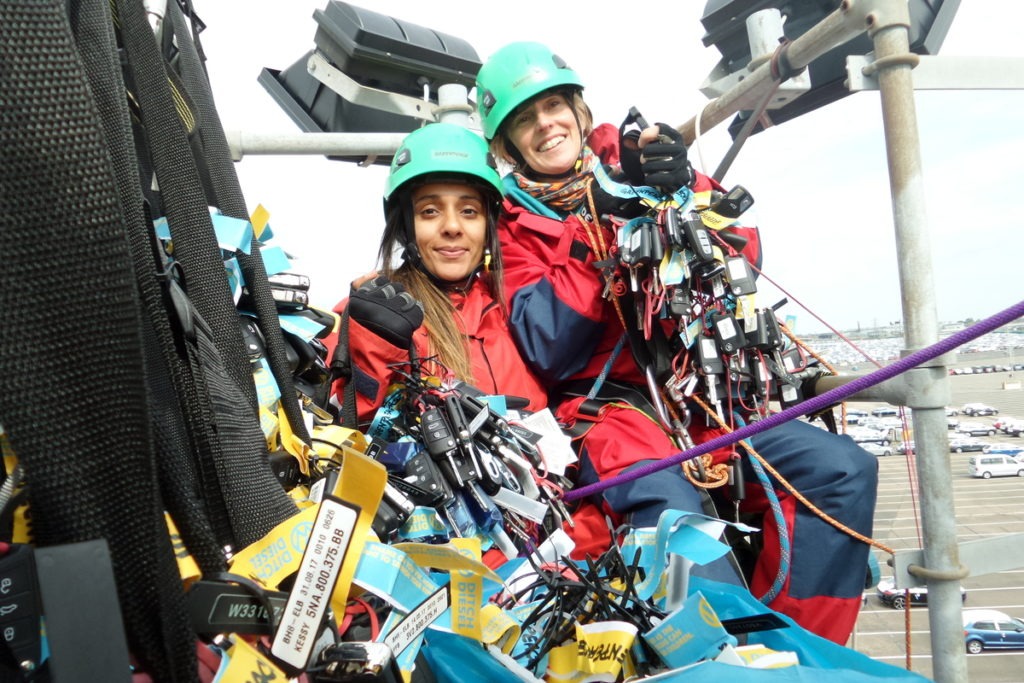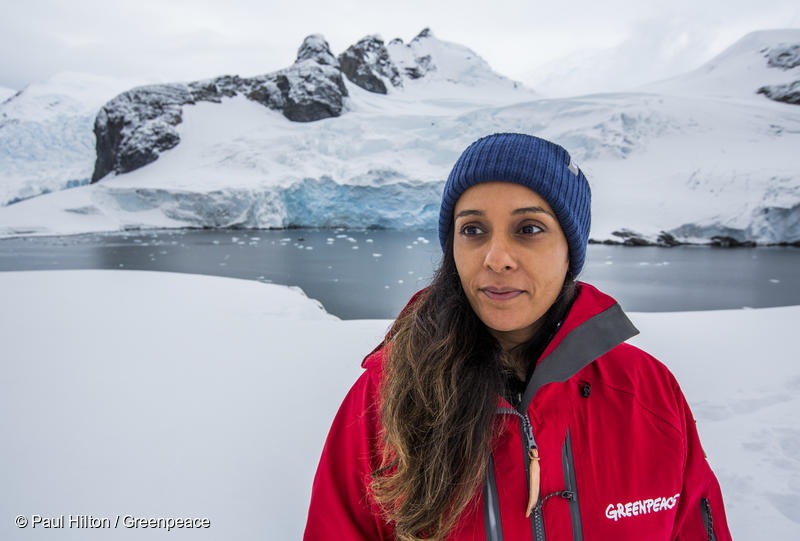I want Greenpeace to inspire people of colour—especially women—to feel safe in taking action on issues that are important to them and empowered to reject inequality.

Greenpeace volunteers gain access to the vehicle park at Sheerness port in Kent where several thousand VW cars are awaiting distribution to suppliers. The volunteers, including many mothers, fathers and people from all walks of life, attempt to immobilise all of the VW diesel cars by removing the keys. Photo Credit: © Will Rose / Greenpeace
Your Name: Meena Rajput
I currently reside in: My one bedroom flat in Brixton, London, UK.
What’s your favorite hangout in London? Brockwell Park, which is close to my flat. I’m not really a city person, so being as close to nature as possible while living in London is so important to me. Ideally, I’d love to live by the ocean. One day!
I currently work as a: Diversity and Inclusion Lead at Greenpeace and I’m an activist.
I do this because: I’m not an “eco-warrior” as you might expect someone working at Greenpeace to be. I’m driven by the fight for equality, which in effect also leads to the protection of vulnerable species, their habitats, and nature in general. So I guess you could call me a “justice warrior”. But essentially we all want the same thing: a green and peaceful world where all people are treated with equality. That’s why I’m leading Diversity & Inclusion at Greenpeace UK: environmental abuses and climate change disproportionately affect people of colour—especially in the Global South, but also in poorer communities of the Global North. The bigger campaigning organisations need to do much better at engaging people of colour and talking about how social justice intersects with climate change. Greenpeace is giving me the platform to do that work.
Greenpeace has also given me a legitimate voice and a safe platform to make my voice heard and take impactful non-violent direct action (NVDA), which is a form of activism that was originally introduced to the world by marginalised people. Over the last 6 years, I have taken effective action against our government as well as huge corporations including VW, Coca-Cola, Shell, BP and the entire krill fishing industry. When rich and powerful decision makers go about business in a way that knowingly harms the lives and livelihoods of others simply to quench their obsessive thirst for more money and more power, I’m not ok with that. This behaviour reinforces inequality, and if we stand by and let it happen we are responsible for reinforcing inequality, too.
I want Greenpeace to inspire people of colour—especially women—to feel safe in taking action on issues that are important to them and empowered to reject inequality. Talking about issues, listening, learning, signing petitions, writing to MPs, joining local groups, and taking non-violent direct actions are all ways in which we can be heard. We don’t often realise this (because that’s how oppression works), but we are relatively lucky in this country to be able to do so, and I can’t be complacent about that. The Indian government often silences our colleagues at Greenpeace India by freezing access to their funds. It’s corruption like this that makes it even more important for those of us who can speak up and take action to do so on behalf of those who can’t.
What are some Indian traditions you still follow? In my view, a lot of Indian traditions sadly reinforce huge amounts of social inequality—especially gender inequality. So, I reject them out of principle.
Basically, if a tradition promotes any form of inequality, I believe we should leave them in the past and instead adapt them or create new traditions that promote equality.
Don’t get me wrong, I love my Indian heritage. I say ‘Namaste’ to all my elders, I go home for Diwali, and I do follow Raksha Bandhan—but my cousin sisters and I make a point of tying a rakhi on each other, too!
Bollywood or Hollywood, and why? OMG, I love Bollywood these days! But I can’t wax lyrical about social equality and then claim to be a massive Bollywood fan. Bollywood is like ‘Inequality Central’ most of the time. I used to absolutely hate watching Bollywood films when I was younger. I would become so enraged that society—especially women—seemed to not only have no objection to the blatant demonstrations of how badly women were treated by society, but that they would enjoy it! It blew my mind.
So you can imagine my delight at age 14 when 1942 Love Story came out! It was the first time Bollywood would show a kiss on the lips—no hiding under umbrellas or behind a bunch of balloons. I remember sitting in our living room surrounded by an array of masis and masas jis, mamis and mama jis, lots of cousins, my mum, dad and brother, and my nani ji. There was such an uproar when Anil Kapoor’s and Manisha Koirala’s lips touched. It was pretty amusing to watch their reaction. “Finally,” I thought, “someone is causing waves.”
Thankfully, Bollywood scripts are getting better these days and female empowerment is being promoted in a big way—especially by actors like Deepika Padukone and Priyanka Chopra. I’ve also seen a few good films that powerfully raise awareness of serious issues such as gender violence, homophobia, and alcoholism and drug abuse.
Also, let’s face it, the songs are pretty awesome these days – and we all try to copy Deepika’s dance moves right?
Favorite movie? I love films like Zootopia. It’s about an awesome little bunny rabbit who joins the police force and faces a lot of discrimination for being a ‘she’ rabbit. She faces lots of knock-backs and doubts herself at times, but her sheer determination and awesomeness eventually leads her to being the best—even better than those who try to bring her down.
My job can be draining, emotionally, mentally and physically. That’s why I love films like this. They are super cute, fun and positive, and they make me smile. The best thing about them is that young girls are watching them, so there are positive stories being told to those who really need to hear them.
What’s your favorite thing about Indian culture? When I was younger I was very angry with Indian culture because I thought it oppressed women. I wasn’t able to articulate it the way I can now—I just knew it wasn’t right or fair. Naturally, I blamed my parents and my brother and my extended family for being the enforcers of this oppressive way of life. I would get intensely irate when they silenced my protests by telling me I was ‘creating a fuss’. And I especially resented the women for not resisting more, like I was.
But the older I became, the more I realised that my parents and wider family—like all women and people of colour—were victims of this oppression as much as I was. And so, I decided to take my family along on the fight with me. Whatever I fought for, I did it to benefit all of us. I shared my experiences with them if they showed interest, and I focused on loving and appreciating them rather than fighting them.
So, the best thing about ‘my’ experience of Indian culture is the strength and loyalty of my family. And not just my mum, dad, and brother. But also my masis, masars, bhuas, fufars, mamis, mamas, chachas, chachis, cousins, nieces, nephews, grandparents. And their neighbours, and their kids and everyone else who feels like getting involved!
When I climbed up a fishing ship in the Antarctic, confiscated thousands of VW diesel cars keys, and sang Christmas carols outside of Coca-Cola’s giant billboard in Piccadilly Circus, my family were incredibly proud of me—no one more so than my mum and my brother. My dad, unfortunately, passed away 4 years ago —just as I started taking non-violent direct actions with Greenpeace, but my mum often reassures me by saying ‘your dad would’ve been so proud to see what you’ve done with our family name.’
What’s more, they are totally engaged in the issues that I campaign on—which was definitely unexpected! I was at a family function last year and the strangest thing happened: my Masi grabbed my hand and marched me over to another aunty of some sorts, exclaiming, “Meena putt! This is Shanti aunty. You know Shanti? She’s my neighbour’s bhabi’s friend’s cousin. You met her when you were two years old.” I thought, “Here we go,” but instead of introducing the subject of meeting this lady’s son, my masi said, “Tell her about when you went to protect the Antarctic and the penguins!” I was so proud of her…and relieved!
What’s one piece of advice your parents have given you that should probably be or are abiding by? I really do have the best parents ever. Once they realised I wasn’t going to be an obedient Indian daughter they scrapped the kind of advice you’d expect from Indian parents and came up with alternatives.
I remember when I got my first job after university. It was a Marketing Assistant role for an action sports company in Nottingham—100 miles from home. Out of politeness and respect, I asked if I could go (obviously I had an entire argument as to why I should be allowed had they said no!). My dad replied, “Meena putt. I have no idea what plans you have for your life because you refuse to listen to our advice. So the only advice I can give you is to give it a try. If it all goes wrong what’s the worst that can happen? You’ll have to come back home to me and your mum and we’ll look after you? And then you try something else! That’s the worst that can ever happen to you.”
My dad also taught me never to work just to make money. “I’m doing that (working just to make money) so that you don’t need to,” he had said to me, making me appreciate the sacrifices that my parents had made in order to fulfill their duties as husband and wife, and as parents. “Do what you really want to do and make sure you contribute something good,” he said.
My parents and my brother (my biggest advocate) gave me the courage to go out into the world and create entirely new possibilities for myself and for my entire family. I understand this is a rarity, and I’m incredibly grateful to have been born to them.
Of course, the other piece of advice is ‘get married and have kids’ which is offered as a solution —literally—to every problem!
Good Indian Girl? I’m a Great Indian Woman!
You can follow Meena Rajput and her Arctic adventures and more on Instagram @meenarajput.



 Ringing in Change: Sakhi’s Historic Achievement
Ringing in Change: Sakhi’s Historic Achievement Good Indian Girl, Sort Of: Sonya Soni
Good Indian Girl, Sort Of: Sonya Soni Ambika Mod Makes Us Bawl Our Eyes Out in ‘One Day’
Ambika Mod Makes Us Bawl Our Eyes Out in ‘One Day’